04-Tomcat
1. autoConfig
- SpringBoot搭建一个web应用程序时,只需要引入
spring-boot-starter-web,Tomcat的实现机制也是自动装配 - 应用启动时,会自动启动嵌入式Tomcat作为web服务器
# Auto Configure
org.springframework.boot.autoconfigure.EnableAutoConfiguration=\
org.springframework.boot.autoconfigure.web.servlet.ServletWebServerFactoryAutoConfiguration,\
1. ServletWebServerFactoryAutoCfg
@Configuration(proxyBeanMethods = false)
@AutoConfigureOrder(Ordered.HIGHEST_PRECEDENCE)
@ConditionalOnClass(ServletRequest.class)
@ConditionalOnWebApplication(type = Type.SERVLET)
// 1.
@EnableConfigurationProperties(ServerProperties.class)
// 2.. ServletWebServerFactoryConfiguration
@Import({ ServletWebServerFactoryAutoConfiguration.BeanPostProcessorsRegistrar.class,
ServletWebServerFactoryConfiguration.EmbeddedTomcat.class,
ServletWebServerFactoryConfiguration.EmbeddedJetty.class,
ServletWebServerFactoryConfiguration.EmbeddedUndertow.class })
public class ServletWebServerFactoryAutoConfiguration {
@Bean
public ServletWebServerFactoryCustomizer servletWebServerFactoryCustomizer(ServerProperties serverProperties) {
return new ServletWebServerFactoryCustomizer(serverProperties);
}
// 2. Tomcat, ServerProperties
@Bean
@ConditionalOnClass(name = "org.apache.catalina.startup.Tomcat")
public TomcatServletWebServerFactoryCustomizer tomcatServletWebServerFactoryCustomizer(
ServerProperties serverProperties) {
return new TomcatServletWebServerFactoryCustomizer(serverProperties);
}
@Bean
@ConditionalOnMissingFilterBean(ForwardedHeaderFilter.class)
@ConditionalOnProperty(value = "server.forward-headers-strategy", havingValue = "framework")
public FilterRegistrationBean<ForwardedHeaderFilter> forwardedHeaderFilter() {
ForwardedHeaderFilter filter = new ForwardedHeaderFilter();
FilterRegistrationBean<ForwardedHeaderFilter> registration = new FilterRegistrationBean<>(filter);
registration.setDispatcherTypes(DispatcherType.REQUEST, DispatcherType.ASYNC, DispatcherType.ERROR);
registration.setOrder(Ordered.HIGHEST_PRECEDENCE);
return registration;
}
/**
* Registers a {@link WebServerFactoryCustomizerBeanPostProcessor}. Registered via
* {@link ImportBeanDefinitionRegistrar} for early registration.
*/
public static class BeanPostProcessorsRegistrar implements ImportBeanDefinitionRegistrar, BeanFactoryAware {
private ConfigurableListableBeanFactory beanFactory;
@Override
public void setBeanFactory(BeanFactory beanFactory) throws BeansException {
if (beanFactory instanceof ConfigurableListableBeanFactory) {
this.beanFactory = (ConfigurableListableBeanFactory) beanFactory;
}
}
@Override
public void registerBeanDefinitions(AnnotationMetadata importingClassMetadata,
BeanDefinitionRegistry registry) {
if (this.beanFactory == null) {
return;
}
registerSyntheticBeanIfMissing(registry, "webServerFactoryCustomizerBeanPostProcessor",
WebServerFactoryCustomizerBeanPostProcessor.class);
registerSyntheticBeanIfMissing(registry, "errorPageRegistrarBeanPostProcessor",
ErrorPageRegistrarBeanPostProcessor.class);
}
private void registerSyntheticBeanIfMissing(BeanDefinitionRegistry registry, String name, Class<?> beanClass) {
if (ObjectUtils.isEmpty(this.beanFactory.getBeanNamesForType(beanClass, true, false))) {
RootBeanDefinition beanDefinition = new RootBeanDefinition(beanClass);
beanDefinition.setSynthetic(true);
registry.registerBeanDefinition(name, beanDefinition);
}
}
}
}
2. ServerProperties
@ConfigurationProperties(prefix = "server", ignoreUnknownFields = true)
public class ServerProperties {
/** Server HTTP port. */
private Integer port;
/** Network address to which the server should bind. */
private InetAddress address;
/** Value to use for the Server response header (if empty, no header is sent). */
private String serverHeader;
// ...
}
3. ServletWebServerFactoryCfg
EmbeddedTomcat=>TomcatServletWebServerFactoryEmbeddedJettyEmbeddedUndertow
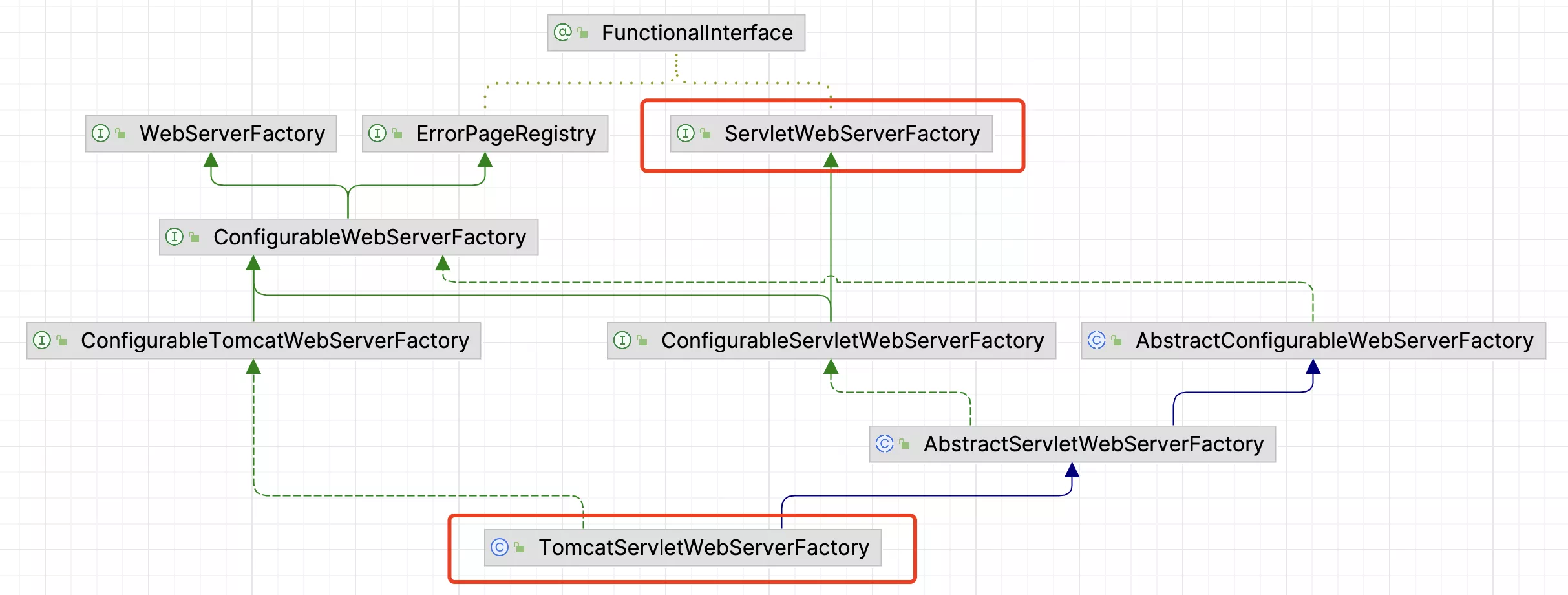
@Configuration(proxyBeanMethods = false)
class ServletWebServerFactoryConfiguration {
@Configuration(proxyBeanMethods = false)
@ConditionalOnClass({ Servlet.class, Tomcat.class, UpgradeProtocol.class })
@ConditionalOnMissingBean(value = ServletWebServerFactory.class, search = SearchStrategy.CURRENT)
public static class EmbeddedTomcat {
@Bean
public TomcatServletWebServerFactory tomcatServletWebServerFactory(
ObjectProvider<TomcatConnectorCustomizer> connectorCustomizers,
ObjectProvider<TomcatContextCustomizer> contextCustomizers,
ObjectProvider<TomcatProtocolHandlerCustomizer<?>> protocolHandlerCustomizers) {
TomcatServletWebServerFactory factory = new TomcatServletWebServerFactory();
factory.getTomcatConnectorCustomizers()
.addAll(connectorCustomizers.orderedStream().collect(Collectors.toList()));
factory.getTomcatContextCustomizers()
.addAll(contextCustomizers.orderedStream().collect(Collectors.toList()));
factory.getTomcatProtocolHandlerCustomizers()
.addAll(protocolHandlerCustomizers.orderedStream().collect(Collectors.toList()));
return factory;
}
}
/**
* Nested configuration if Jetty is being used.
*/
@Configuration(proxyBeanMethods = false)
@ConditionalOnClass({ Servlet.class, Server.class, Loader.class, WebAppContext.class })
@ConditionalOnMissingBean(value = ServletWebServerFactory.class, search = SearchStrategy.CURRENT)
public static class EmbeddedJetty {
@Bean
public JettyServletWebServerFactory JettyServletWebServerFactory(
ObjectProvider<JettyServerCustomizer> serverCustomizers) {
JettyServletWebServerFactory factory = new JettyServletWebServerFactory();
factory.getServerCustomizers().addAll(serverCustomizers.orderedStream().collect(Collectors.toList()));
return factory;
}
}
/**
* Nested configuration if Undertow is being used.
*/
@Configuration(proxyBeanMethods = false)
@ConditionalOnClass({ Servlet.class, Undertow.class, SslClientAuthMode.class })
@ConditionalOnMissingBean(value = ServletWebServerFactory.class, search = SearchStrategy.CURRENT)
public static class EmbeddedUndertow {
@Bean
public UndertowServletWebServerFactory undertowServletWebServerFactory(
ObjectProvider<UndertowDeploymentInfoCustomizer> deploymentInfoCustomizers,
ObjectProvider<UndertowBuilderCustomizer> builderCustomizers) {
UndertowServletWebServerFactory factory = new UndertowServletWebServerFactory();
factory.getDeploymentInfoCustomizers()
.addAll(deploymentInfoCustomizers.orderedStream().collect(Collectors.toList()));
factory.getBuilderCustomizers().addAll(builderCustomizers.orderedStream().collect(Collectors.toList()));
return factory;
}
}
}
2. ServletWebServerAC
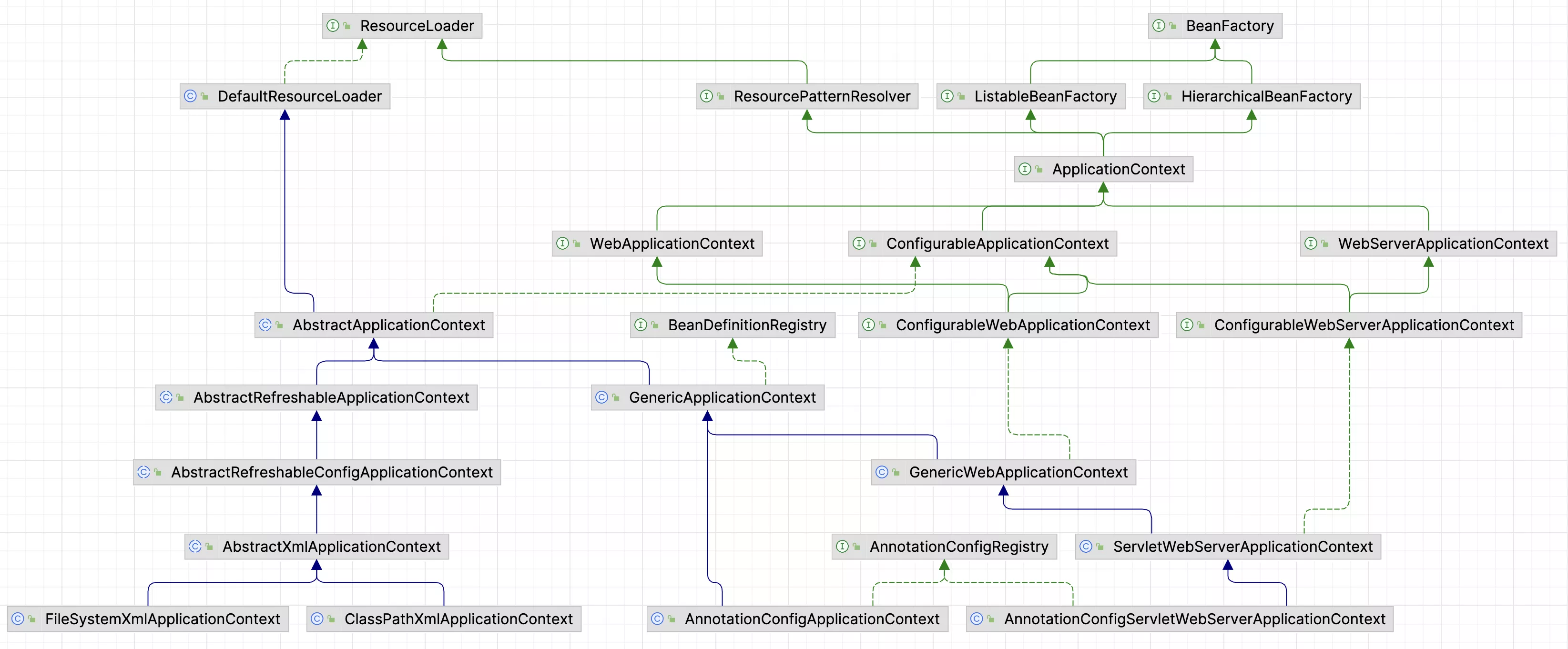
onRefresh()=>createWebServer()=> Tomcat的创建,和控制台的日志打印finishRefresh()=>startWebServer()=> Tomcat启动
public class ServletWebServerApplicationContext extends GenericWebApplicationContext
implements ConfigurableWebServerApplicationContext {
private volatile WebServer webServer;
@Override
protected void onRefresh() {
super.onRefresh();
try {
// 1..
createWebServer();
}
catch (Throwable ex) {
throw new ApplicationContextException("Unable to start web server", ex);
}
}
// ----------------------------------------------------------- 初始化Tomcat
private void createWebServer() {
WebServer webServer = this.webServer;
ServletContext servletContext = getServletContext();
if (webServer == null && servletContext == null) {
// 1.. TomcatServletWebServerFactory
ServletWebServerFactory factory = getWebServerFactory();
// 2... TomcatServletWebServerFactory => TomcatWebServer
this.webServer = factory.getWebServer(getSelfInitializer());
}
else if (servletContext != null) {
try {
getSelfInitializer().onStartup(servletContext);
}
catch (ServletException ex) {
throw new ApplicationContextException("Cannot initialize servlet context", ex);
}
}
// 替换servlet相关的属性资源
initPropertySources();
}
protected ServletWebServerFactory getWebServerFactory() {
// Use bean names so that we don't consider the hierarchy
// 1. tomcatServletWebServerFactory
String[] beanNames = getBeanFactory().getBeanNamesForType(ServletWebServerFactory.class);
if (beanNames.length == 0) {
throw new ApplicationContextException("Unable to start ServletWebServerApplicationContext due to missing "
+ "ServletWebServerFactory bean.");
}
if (beanNames.length > 1) {
throw new ApplicationContextException("Unable to start ServletWebServerApplicationContext due to multiple "
+ "ServletWebServerFactory beans : " + StringUtils.arrayToCommaDelimitedString(beanNames));
}
// 2.
return getBeanFactory().getBean(beanNames[0], ServletWebServerFactory.class);
}
// ----------------------------------------------------------- 启动Tomcat
@Override
protected void finishRefresh() {
super.finishRefresh();
// 1..
WebServer webServer = startWebServer();
if (webServer != null) {
// 发布webServer初始化完成事件
publishEvent(new ServletWebServerInitializedEvent(webServer, this));
}
}
private WebServer startWebServer() {
WebServer webServer = this.webServer;
if (webServer != null) {
// 1... TomcatWebServer
webServer.start();
}
return webServer;
}
// ----------------------------------------------------------- 停止Tomcat
@Override
protected void onClose() {
super.onClose();
// 1..
stopAndReleaseWebServer();
}
private void stopAndReleaseWebServer() {
WebServer webServer = this.webServer;
if (webServer != null) {
try {
// 1... TomcatWebServer
webServer.stop();
this.webServer = null;
}
catch (Exception ex) {
throw new IllegalStateException(ex);
}
}
}
}
1. TomcatServletWebServerFactory

public class TomcatServletWebServerFactory extends AbstractServletWebServerFactory
implements ConfigurableTomcatWebServerFactory, ResourceLoaderAware {
@Override
public WebServer getWebServer(ServletContextInitializer... initializers) {
if (this.disableMBeanRegistry) {
Registry.disableRegistry();
}
// 1. Tomcat
Tomcat tomcat = new Tomcat();
File baseDir = (this.baseDirectory != null) ? this.baseDirectory : createTempDir("tomcat");
tomcat.setBaseDir(baseDir.getAbsolutePath());
Connector connector = new Connector(this.protocol);
connector.setThrowOnFailure(true);
// 2... Tomcat new StandardServer() <= new StandardService()
tomcat.getService().addConnector(connector);
customizeConnector(connector);
// 3. Service <= Connector
tomcat.setConnector(connector);
// 4. Service <= new Engine() <= new StandardHost()
tomcat.getHost().setAutoDeploy(false);
configureEngine(tomcat.getEngine());
for (Connector additionalConnector : this.additionalTomcatConnectors) {
tomcat.getService().addConnector(additionalConnector);
}
// 准备tomcatEmbeddedContext并设置到tomcat中
prepareContext(tomcat.getHost(), initializers);
// 5.. 构建tomcatWebServer
return getTomcatWebServer(tomcat);
}
protected TomcatWebServer getTomcatWebServer(Tomcat tomcat) {
// 1... TomcatWebServer
return new TomcatWebServer(tomcat, getPort() >= 0);
}
}
2. TomcatWebServer
public class TomcatWebServer implements WebServer {
private final Object monitor = new Object();
private final Map<Service, Connector[]> serviceConnectors = new HashMap<>();
private final boolean autoStart;
private volatile boolean started;
private final Tomcat tomcat;
/**
* Create a new {@link TomcatWebServer} instance.
* @param tomcat the underlying Tomcat server
* @param autoStart if the server should be started
*/
public TomcatWebServer(Tomcat tomcat, boolean autoStart) {
Assert.notNull(tomcat, "Tomcat Server must not be null");
this.tomcat = tomcat;
this.autoStart = autoStart;
// 1..
initialize();
}
private void initialize() throws WebServerException {
// 1. console
logger.info("Tomcat initialized with port(s): " + getPortsDescription(false));
synchronized (this.monitor) {
try {
addInstanceIdToEngineName();
Context context = findContext();
context.addLifecycleListener((event) -> {
if (context.equals(event.getSource()) && Lifecycle.START_EVENT.equals(event.getType())) {
// Remove service connectors so that protocol binding doesn't
// happen when the service is started.
removeServiceConnectors();
}
});
// 2... Start the server to trigger initialization listeners
this.tomcat.start();
// We can re-throw failure exception directly in the main thread
// 主线程中重新抛出失败异常
rethrowDeferredStartupExceptions();
try {
ContextBindings.bindClassLoader(context, context.getNamingToken(), getClass().getClassLoader());
}
catch (NamingException ex) {
// Naming is not enabled. Continue
}
// Unlike Jetty, all Tomcat threads are daemon threads. We create a
// blocking non-daemon to stop immediate shutdown
// 所有的tomcat线程都是守护线程,我们创建一个阻塞非守护线程来避免立即关闭
startDaemonAwaitThread();
}
catch (Exception ex) {
// 异常停止tomcat
stopSilently();
destroySilently();
throw new WebServerException("Unable to start embedded Tomcat", ex);
}
}
}
@Override
public void start() throws WebServerException {
synchronized (this.monitor) {
if (this.started) {
return;
}
try {
// 添加之前移除的connector
addPreviouslyRemovedConnectors();
Connector connector = this.tomcat.getConnector();
if (connector != null && this.autoStart) {
// 延迟加载启动
performDeferredLoadOnStartup();
}
// 检查connector启动状态是否为失败,失败抛出异常
checkThatConnectorsHaveStarted();
// 1.
this.started = true;
// 2. 打印Tomcat日志
logger.info("Tomcat started on port(s): " + getPortsDescription(true) + " with context path '"
+ getContextPath() + "'");
}
catch (ConnectorStartFailedException ex) {
// 异常停止tomcat
stopSilently();
throw ex;
}
catch (Exception ex) {
if (findBindException(ex) != null) {
throw new PortInUseException(this.tomcat.getConnector().getPort());
}
throw new WebServerException("Unable to start embedded Tomcat server", ex);
}
finally {
Context context = findContext();
// context解绑classload
ContextBindings.unbindClassLoader(context, context.getNamingToken(), getClass().getClassLoader());
}
}
}
@Override
public void stop() throws WebServerException {
synchronized (this.monitor) {
boolean wasStarted = this.started;
try {
this.started = false;
try {
// 1..
stopTomcat();
this.tomcat.destroy();
}
catch (LifecycleException ex) {
// swallow and continue
}
}
catch (Exception ex) {
throw new WebServerException("Unable to stop embedded Tomcat", ex);
}
finally {
if (wasStarted) {
containerCounter.decrementAndGet();
}
}
}
}
private void stopTomcat() throws LifecycleException {
if (Thread.currentThread().getContextClassLoader() instanceof TomcatEmbeddedWebappClassLoader) {
Thread.currentThread().setContextClassLoader(getClass().getClassLoader());
}
// 1...
this.tomcat.stop();
}
private String getPortsDescription(boolean localPort) {
StringBuilder ports = new StringBuilder();
for (Connector connector : this.tomcat.getService().findConnectors()) {
if (ports.length() != 0) {
ports.append(' ');
}
int port = localPort ? connector.getLocalPort() : connector.getPort();
ports.append(port).append(" (").append(connector.getScheme()).append(')');
}
return ports.toString();
}
}
3. Tomcat
Server => Service => Connector => Host => Context
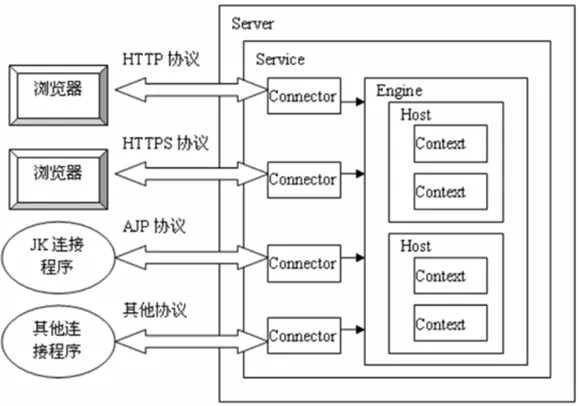
public class Tomcat {
protected Server server;
protected int port = 8080;
protected String hostname = "localhost";
protected String basedir;
public void start() throws LifecycleException {
// 1..
getServer();
// 2... LifecycleBase
server.start();
}
public Service getService() {
// 1..
return getServer().findServices()[0];
}
public Server getServer() {
if (server != null) {
return server;
}
System.setProperty("catalina.useNaming", "false");
// 1.
server = new StandardServer();
initBaseDir();
// Set configuration source
ConfigFileLoader.setSource(new CatalinaBaseConfigurationSource(new File(basedir), null));
server.setPort( -1 );
// 2.
Service service = new StandardService();
service.setName("Tomcat");
// 3.
server.addService(service);
return server;
}
/**
* Stop the server.
*
* @throws LifecycleException Stop error
*/
public void stop() throws LifecycleException {
getServer();
// 1...
server.stop();
}
public void setConnector(Connector connector) {
Service service = getService();
boolean found = false;
for (Connector serviceConnector : service.findConnectors()) {
if (connector == serviceConnector) {
found = true;
}
}
if (!found) {
service.addConnector(connector);
}
}
public Host getHost() {
Engine engine = getEngine();
if (engine.findChildren().length > 0) {
return (Host) engine.findChildren()[0];
}
Host host = new StandardHost();
host.setName(hostname);
getEngine().addChild(host);
return host;
}
public Engine getEngine() {
Service service = getServer().findServices()[0];
if (service.getContainer() != null) {
return service.getContainer();
}
Engine engine = new StandardEngine();
engine.setName( "Tomcat" );
engine.setDefaultHost(hostname);
engine.setRealm(createDefaultRealm());
service.setContainer(engine);
return engine;
}
}
1. StandardServer
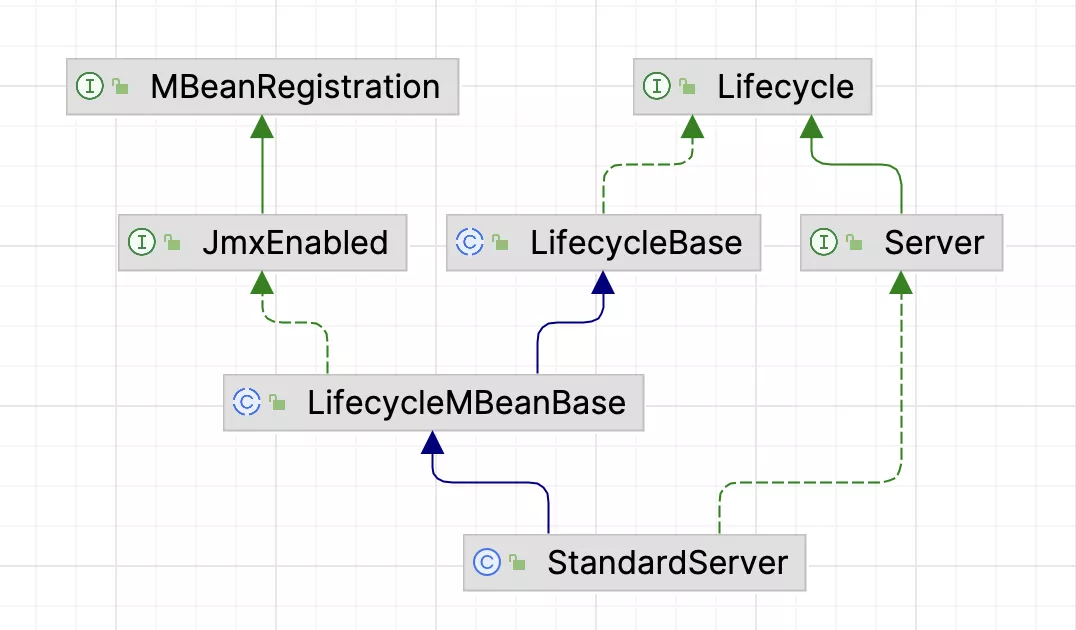
public final class StandardServer extends LifecycleMBeanBase implements Server {
/** The address on which we wait for shutdown commands. */
private String address = "localhost";
/** The set of Services associated with this Server. */
private Service services[] = new Service[0];
/**
* Invoke a pre-startup initialization. This is used to allow connectors
* to bind to restricted ports under Unix operating environments.
*/
@Override
protected void initInternal() throws LifecycleException {
super.initInternal();
// Initialize utility executor
reconfigureUtilityExecutor(getUtilityThreadsInternal(utilityThreads));
register(utilityExecutor, "type=UtilityExecutor");
// Register global String cache
// Note although the cache is global, if there are multiple Servers
// present in the JVM (may happen when embedding) then the same cache
// will be registered under multiple names
onameStringCache = register(new StringCache(), "type=StringCache");
// Register the MBeanFactory
MBeanFactory factory = new MBeanFactory();
factory.setContainer(this);
onameMBeanFactory = register(factory, "type=MBeanFactory");
// Register the naming resources
// 1. 用来解析Server.xml
globalNamingResources.init();
// Populate the extension validator with JARs from common and shared
// class loaders
if (getCatalina() != null) {
ClassLoader cl = getCatalina().getParentClassLoader();
// Walk the class loader hierarchy. Stop at the system class loader.
// This will add the shared (if present) and common class loaders
while (cl != null && cl != ClassLoader.getSystemClassLoader()) {
if (cl instanceof URLClassLoader) {
URL[] urls = ((URLClassLoader) cl).getURLs();
for (URL url : urls) {
if (url.getProtocol().equals("file")) {
try {
File f = new File (url.toURI());
if (f.isFile() &&
f.getName().endsWith(".jar")) {
ExtensionValidator.addSystemResource(f);
}
} catch (URISyntaxException e) {
// Ignore
} catch (IOException e) {
// Ignore
}
}
}
}
cl = cl.getParent();
}
}
// Initialize our defined Services
for (int i = 0; i < services.length; i++) {
// 2.. LifecycleBase
services[i].init();
}
}
@Override
protected void startInternal() throws LifecycleException {
fireLifecycleEvent(CONFIGURE_START_EVENT, null);
// 1.
setState(LifecycleState.STARTING);
// 2.
globalNamingResources.start();
// Start our defined Services
synchronized (servicesLock) {
for (int i = 0; i < services.length; i++) {
// 3...
services[i].start();
}
}
if (periodicEventDelay > 0) {
monitorFuture = getUtilityExecutor().scheduleWithFixedDelay(
new Runnable() {
@Override
public void run() {
startPeriodicLifecycleEvent();
}
}, 0, 60, TimeUnit.SECONDS);
}
}
@Override
protected void stopInternal() throws LifecycleException {
// Pause connectors first
synchronized (connectorsLock) {
for (Connector connector: connectors) {
connector.pause();
// Close server socket if bound on start
// Note: test is in AbstractEndpoint
connector.getProtocolHandler().closeServerSocketGraceful();
}
}
if(log.isInfoEnabled())
log.info(sm.getString("standardService.stop.name", this.name));
// 1..
setState(LifecycleState.STOPPING);
// Stop our defined Container second
if (engine != null) {
synchronized (engine) {
// 2.
engine.stop();
}
}
// Now stop the connectors
synchronized (connectorsLock) {
for (Connector connector: connectors) {
if (!LifecycleState.STARTED.equals(
connector.getState())) {
// Connectors only need stopping if they are currently
// started. They may have failed to start or may have been
// stopped (e.g. via a JMX call)
continue;
}
// 3.
connector.stop();
}
}
// If the Server failed to start, the mapperListener won't have been
// started
if (mapperListener.getState() != LifecycleState.INITIALIZED) {
// 4.
mapperListener.stop();
}
synchronized (executors) {
for (Executor executor: executors) {
executor.stop();
}
}
}
}
2. StandardService
public class StandardService extends LifecycleMBeanBase implements Service {
/** The name of this service. */
private String name = null;
/** The set of Connectors associated with this Service. */
protected Connector connectors[] = new Connector[0];
private Engine engine = null;
@Override
protected void initInternal() throws LifecycleException {
super.initInternal();
if (engine != null) {
// 1... LifecycleBase
engine.init();
}
// Initialize any Executors
for (Executor executor : findExecutors()) {
if (executor instanceof JmxEnabled) {
((JmxEnabled) executor).setDomain(getDomain());
}
executor.init();
}
// 2... LifecycleBase Initialize mapper listener
// 处理url与servlet映射关系
mapperListener.init();
// Initialize our defined Connectors
synchronized (connectorsLock) {
for (Connector connector : connectors) {
// 3. LifecycleBase
connector.init();
}
}
}
@Override
protected void startInternal() throws LifecycleException {
// 1. 输出 `Starting service [Tomcat]`
if(log.isInfoEnabled())
log.info(sm.getString("standardService.start.name", this.name));
// 2.
setState(LifecycleState.STARTING);
// Start our defined Container first
if (engine != null) {
synchronized (engine) {
// 3... LifecycleBase
engine.start();
}
}
synchronized (executors) {
for (Executor executor: executors) {
executor.start();
}
}
// 4.
mapperListener.start();
// Start our defined Connectors second
synchronized (connectorsLock) {
for (Connector connector: connectors) {
// If it has already failed, don't try and start it
if (connector.getState() != LifecycleState.FAILED) {
// 5.
connector.start();
}
}
}
}
}
1. StandardEngine
public class StandardEngine extends ContainerBase implements Engine {
/** The child Containers belonging to this Container, keyed by name. */
protected final HashMap<String, Container> children = new HashMap<>();
@Override
protected void initInternal() throws LifecycleException {
// Ensure that a Realm is present before any attempt is made to start
// one. This will create the default NullRealm if necessary.
getRealm(); // 解析Tomcat用户、密码
super.initInternal();
}
@Override
protected synchronized void startInternal() throws LifecycleException {
// Log our server identification information
// 1. 输出 `Starting Servlet engine: [Apache Tomcat/9.0.29]`
if (log.isInfoEnabled()) {
log.info(sm.getString("standardEngine.start", ServerInfo.getServerInfo()));
}
// 2. ContainerBase Standard container startup
super.startInternal();
}
}
1. ContainerBase
public abstract class ContainerBase extends LifecycleMBeanBase
implements Container {
@Override
protected synchronized void startInternal() throws LifecycleException {
// Start our subordinate components, if any
logger = null;
getLogger();
Cluster cluster = getClusterInternal();
if (cluster instanceof Lifecycle) { // skip
((Lifecycle) cluster).start();
}
Realm realm = getRealmInternal();
if (realm instanceof Lifecycle) {
// 1. Realm处理
((Lifecycle) realm).start();
}
// Start our child containers, if any
Container children[] = findChildren();
List<Future<Void>> results = new ArrayList<>();
for (int i = 0; i < children.length; i++) {
// 2. Engine => Host
results.add(startStopExecutor.submit(new StartChild(children[i])));
}
MultiThrowable multiThrowable = null;
for (Future<Void> result : results) {
try {
result.get();
} catch (Throwable e) {
log.error(sm.getString("containerBase.threadedStartFailed"), e);
if (multiThrowable == null) {
multiThrowable = new MultiThrowable();
}
multiThrowable.add(e);
}
}
if (multiThrowable != null) {
throw new LifecycleException(sm.getString("containerBase.threadedStartFailed"),
multiThrowable.getThrowable());
}
// Start the Valves in our pipeline (including the basic), if any
if (pipeline instanceof Lifecycle) {
// 3. StandardPipeline处理
((Lifecycle) pipeline).start();
}
// 4.
setState(LifecycleState.STARTING);
// Start our thread
if (backgroundProcessorDelay > 0) {
monitorFuture = Container.getService(ContainerBase.this).getServer()
.getUtilityExecutor().scheduleWithFixedDelay(
new ContainerBackgroundProcessorMonitor(), 0, 60, TimeUnit.SECONDS);
}
}
}
2. Connector
public class Connector extends LifecycleMBeanBase {
@Override
protected void initInternal() throws LifecycleException {
super.initInternal();
if (protocolHandler == null) {
throw new LifecycleException(
sm.getString("coyoteConnector.protocolHandlerInstantiationFailed"));
}
// Initialize adapter
adapter = new CoyoteAdapter(this);
protocolHandler.setAdapter(adapter);
if (service != null) {
protocolHandler.setUtilityExecutor(service.getServer().getUtilityExecutor());
}
// Make sure parseBodyMethodsSet has a default
if (null == parseBodyMethodsSet) {
setParseBodyMethods(getParseBodyMethods());
}
if (protocolHandler.isAprRequired() && !AprLifecycleListener.isInstanceCreated()) {
throw new LifecycleException(sm.getString("coyoteConnector.protocolHandlerNoAprListener",
getProtocolHandlerClassName()));
}
if (protocolHandler.isAprRequired() && !AprLifecycleListener.isAprAvailable()) {
throw new LifecycleException(sm.getString("coyoteConnector.protocolHandlerNoAprLibrary",
getProtocolHandlerClassName()));
}
if (AprLifecycleListener.isAprAvailable() && AprLifecycleListener.getUseOpenSSL() &&
protocolHandler instanceof AbstractHttp11JsseProtocol) {
AbstractHttp11JsseProtocol<?> jsseProtocolHandler =
(AbstractHttp11JsseProtocol<?>) protocolHandler;
if (jsseProtocolHandler.isSSLEnabled() &&
jsseProtocolHandler.getSslImplementationName() == null) {
// OpenSSL is compatible with the JSSE configuration, so use it if APR is available
jsseProtocolHandler.setSslImplementationName(OpenSSLImplementation.class.getName());
}
}
try {
// 1.
protocolHandler.init();
} catch (Exception e) {
throw new LifecycleException(
sm.getString("coyoteConnector.protocolHandlerInitializationFailed"), e);
}
}
}
3. StandardHost
public class StandardHost extends ContainerBase implements Host {
/**
* The Java class name of the default Context implementation class for
* deployed web applications.
*/
private String contextClass = "org.apache.catalina.core.StandardContext";
}
3. LifecycleBase
public abstract class LifecycleBase implements Lifecycle {
/**
* 1. The current state of the source component.
*/
private volatile LifecycleState state = LifecycleState.NEW; // 初始状态
@Override
public final synchronized void start() throws LifecycleException {
if (LifecycleState.STARTING_PREP.equals(state) || LifecycleState.STARTING.equals(state) ||
LifecycleState.STARTED.equals(state)) {
if (log.isDebugEnabled()) {
Exception e = new LifecycleException();
log.debug(sm.getString("lifecycleBase.alreadyStarted", toString()), e);
} else if (log.isInfoEnabled()) {
log.info(sm.getString("lifecycleBase.alreadyStarted", toString()));
}
return;
}
if (state.equals(LifecycleState.NEW)) {
// 2..
init();
} else if (state.equals(LifecycleState.FAILED)) {
stop();
} else if (!state.equals(LifecycleState.INITIALIZED) &&
!state.equals(LifecycleState.STOPPED)) {
invalidTransition(Lifecycle.BEFORE_START_EVENT);
}
try {
// 3..
setStateInternal(LifecycleState.STARTING_PREP, null, false);
// 4... StandardServer
startInternal();
if (state.equals(LifecycleState.FAILED)) {
// This is a 'controlled' failure. The component put itself into the
// FAILED state so call stop() to complete the clean-up.
stop();
} else if (!state.equals(LifecycleState.STARTING)) {
// Shouldn't be necessary but acts as a check that sub-classes are
// doing what they are supposed to.
invalidTransition(Lifecycle.AFTER_START_EVENT);
} else {
// 5..
setStateInternal(LifecycleState.STARTED, null, false);
}
} catch (Throwable t) {
// This is an 'uncontrolled' failure so put the component into the
// FAILED state and throw an exception.
handleSubClassException(t, "lifecycleBase.startFail", toString());
}
}
@Override
public final synchronized void init() throws LifecycleException {
if (!state.equals(LifecycleState.NEW)) {
invalidTransition(Lifecycle.BEFORE_INIT_EVENT);
}
try {
// 1.. 设置`INITIALIZING`
setStateInternal(LifecycleState.INITIALIZING, null, false);
// 2... StandardServer, StandardService, StandardEngine
initInternal();
// 3.. 设置`INITIALIZED`
setStateInternal(LifecycleState.INITIALIZED, null, false);
} catch (Throwable t) {
handleSubClassException(t, "lifecycleBase.initFail", toString());
}
}
private synchronized void setStateInternal(LifecycleState state, Object data, boolean check)
throws LifecycleException {
if (log.isDebugEnabled()) {
log.debug(sm.getString("lifecycleBase.setState", this, state));
}
// false
if (check) {
// Must have been triggered by one of the abstract methods (assume
// code in this class is correct)
// null is never a valid state
if (state == null) {
invalidTransition("null");
// Unreachable code - here to stop eclipse complaining about
// a possible NPE further down the method
return;
}
// Any method can transition to failed
// startInternal() permits STARTING_PREP to STARTING
// stopInternal() permits STOPPING_PREP to STOPPING and FAILED to
// STOPPING
if (!(state == LifecycleState.FAILED ||
(this.state == LifecycleState.STARTING_PREP &&
state == LifecycleState.STARTING) ||
(this.state == LifecycleState.STOPPING_PREP &&
state == LifecycleState.STOPPING) ||
(this.state == LifecycleState.FAILED &&
state == LifecycleState.STOPPING))) {
// No other transition permitted
invalidTransition(state.name());
}
}
// 1.
this.state = state;
String lifecycleEvent = state.getLifecycleEvent();
if (lifecycleEvent != null) {
fireLifecycleEvent(lifecycleEvent, data);
}
}
@Override
public final synchronized void stop() throws LifecycleException {
if (LifecycleState.STOPPING_PREP.equals(state) || LifecycleState.STOPPING.equals(state) ||
LifecycleState.STOPPED.equals(state)) {
if (log.isDebugEnabled()) {
Exception e = new LifecycleException();
log.debug(sm.getString("lifecycleBase.alreadyStopped", toString()), e);
} else if (log.isInfoEnabled()) {
log.info(sm.getString("lifecycleBase.alreadyStopped", toString()));
}
return;
}
if (state.equals(LifecycleState.NEW)) {
state = LifecycleState.STOPPED;
return;
}
if (!state.equals(LifecycleState.STARTED) && !state.equals(LifecycleState.FAILED)) {
invalidTransition(Lifecycle.BEFORE_STOP_EVENT);
}
try {
if (state.equals(LifecycleState.FAILED)) {
// Don't transition to STOPPING_PREP as that would briefly mark the
// component as available but do ensure the BEFORE_STOP_EVENT is
// fired
fireLifecycleEvent(BEFORE_STOP_EVENT, null);
} else {
// 1..
setStateInternal(LifecycleState.STOPPING_PREP, null, false);
}
// 2.
stopInternal();
// Shouldn't be necessary but acts as a check that sub-classes are
// doing what they are supposed to.
if (!state.equals(LifecycleState.STOPPING) && !state.equals(LifecycleState.FAILED)) {
invalidTransition(Lifecycle.AFTER_STOP_EVENT);
}
// 3..
setStateInternal(LifecycleState.STOPPED, null, false);
} catch (Throwable t) {
handleSubClassException(t, "lifecycleBase.stopFail", toString());
} finally {
if (this instanceof Lifecycle.SingleUse) {
// Complete stop process first
setStateInternal(LifecycleState.STOPPED, null, false);
destroy();
}
}
}
}
4. Lifecycle
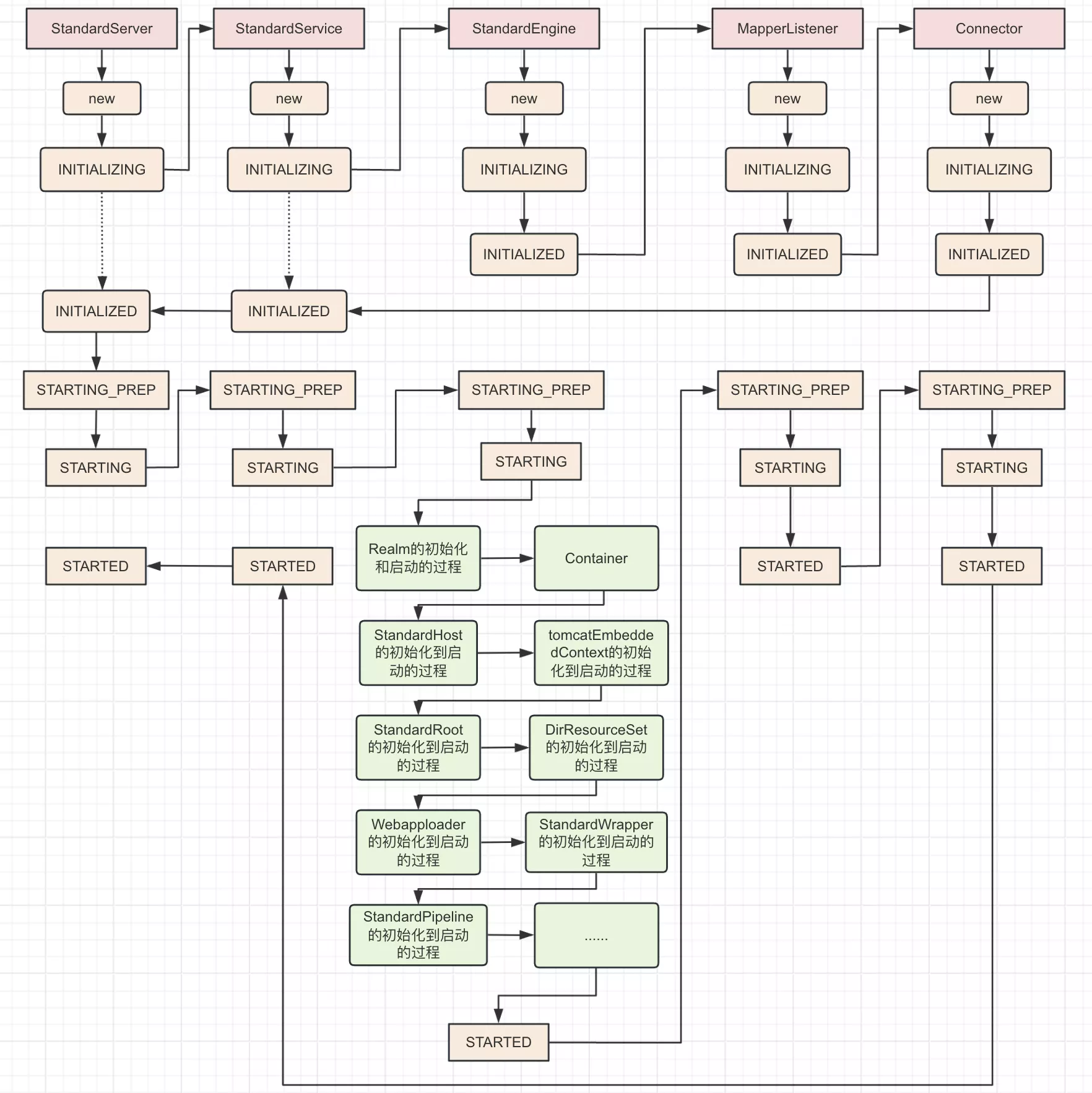
public interface Lifecycle {
public static final String BEFORE_INIT_EVENT = "before_init";
public static final String AFTER_INIT_EVENT = "after_init";
public static final String START_EVENT = "start";
public static final String BEFORE_START_EVENT = "before_start";
public static final String AFTER_START_EVENT = "after_start";
public static final String STOP_EVENT = "stop";
public static final String BEFORE_STOP_EVENT = "before_stop";
public static final String AFTER_STOP_EVENT = "after_stop";
public static final String AFTER_DESTROY_EVENT = "after_destroy";
public static final String BEFORE_DESTROY_EVENT = "before_destroy";
}
1. LifecycleState
public enum LifecycleState {
NEW(false, null),
INITIALIZING(false, Lifecycle.BEFORE_INIT_EVENT),
INITIALIZED(false, Lifecycle.AFTER_INIT_EVENT),
STARTING_PREP(false, Lifecycle.BEFORE_START_EVENT),
STARTING(true, Lifecycle.START_EVENT),
STARTED(true, Lifecycle.AFTER_START_EVENT),
STOPPING_PREP(true, Lifecycle.BEFORE_STOP_EVENT),
STOPPING(false, Lifecycle.STOP_EVENT),
STOPPED(false, Lifecycle.AFTER_STOP_EVENT),
DESTROYING(false, Lifecycle.BEFORE_DESTROY_EVENT),
DESTROYED(false, Lifecycle.AFTER_DESTROY_EVENT),
FAILED(false, null);
}
3. stop
1. SpringApplication
public class SpringApplication {
private void refreshContext(ConfigurableApplicationContext context) {
refresh(context);
if (this.registerShutdownHook) {
try {
// 1. AbstractApplicationContext
context.registerShutdownHook();
}
catch (AccessControlException ex) {
// Not allowed in some environments.
}
}
}
}
2. AbstractApplicationContext
public abstract class AbstractApplicationContext extends DefaultResourceLoader
implements ConfigurableApplicationContext {
/**
* Register a shutdown hook {@linkplain Thread#getName() named}
* {@code SpringContextShutdownHook} with the JVM runtime, closing this
* context on JVM shutdown unless it has already been closed at that time.
* <p>Delegates to {@code doClose()} for the actual closing procedure.
* @see Runtime#addShutdownHook
* @see ConfigurableApplicationContext#SHUTDOWN_HOOK_THREAD_NAME
* @see #close()
* @see #doClose()
*/
@Override
public void registerShutdownHook() {
if (this.shutdownHook == null) {
// No shutdown hook registered yet.
this.shutdownHook = new Thread(SHUTDOWN_HOOK_THREAD_NAME) {
@Override
public void run() {
synchronized (startupShutdownMonitor) {
// 1..
doClose();
}
}
};
Runtime.getRuntime().addShutdownHook(this.shutdownHook);
}
}
/**
* Actually performs context closing: publishes a ContextClosedEvent and
* destroys the singletons in the bean factory of this application context.
* <p>Called by both {@code close()} and a JVM shutdown hook, if any.
* @see org.springframework.context.event.ContextClosedEvent
* @see #destroyBeans()
* @see #close()
* @see #registerShutdownHook()
*/
protected void doClose() {
// Check whether an actual close attempt is necessary...
if (this.active.get() && this.closed.compareAndSet(false, true)) {
if (logger.isDebugEnabled()) {
logger.debug("Closing " + this);
}
LiveBeansView.unregisterApplicationContext(this);
try {
// Publish shutdown event.
publishEvent(new ContextClosedEvent(this));
}
catch (Throwable ex) {
logger.warn("Exception thrown from ApplicationListener handling ContextClosedEvent", ex);
}
// Stop all Lifecycle beans, to avoid delays during individual destruction.
if (this.lifecycleProcessor != null) {
try {
this.lifecycleProcessor.onClose();
}
catch (Throwable ex) {
logger.warn("Exception thrown from LifecycleProcessor on context close", ex);
}
}
// Destroy all cached singletons in the context's BeanFactory.
destroyBeans();
// Close the state of this context itself.
closeBeanFactory();
// Let subclasses do some final clean-up if they wish...
// 1... ServletWebServerApplicationContext
onClose();
// Reset local application listeners to pre-refresh state.
if (this.earlyApplicationListeners != null) {
this.applicationListeners.clear();
this.applicationListeners.addAll(this.earlyApplicationListeners);
}
// Switch to inactive.
this.active.set(false);
}
}
}